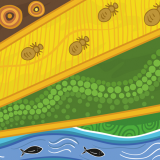Road Map 3 is a comprehensive 10-year strategic framework to improve the health of Australia's Aboriginal and Torres Strait Islander population.
Road Map 3 is accompanied by a triennial Action Plan – developed with the joint National Health and Medical Research Council (NHMRC) and Medical Research Future Fund (MRFF) Indigenous Advisory Group (IAG) – and annual reporting against these actions.
Key documents and reports
The following key documents and reports are available:
- Road Map 3: A strategic framework for improving Aboriginal and Torres Strait Islander health through research (Road Map 3)
- Action Plan (2021–2024)
- Action Plan (2018–2021)
- NHMRC Report Card 2024–25: Aboriginal and Torres Strait Islander research and researchers
- NHMRC Report Card 2023: Aboriginal and Torres Strait Islander research and researchers
- NHMRC Report Card 2022: Aboriginal and Torres Strait Islander research and researchers
- NHMRC Report Card 2021: Aboriginal and Torres Strait Islander research and researchers
- NHMRC Report Card 2020: Aboriginal and Torres Strait Islander research and researchers
- NHMRC Report Card 2019: Aboriginal and Torres Strait Islander research and researchers
- NHMRC Report Card 2018: Aboriginal and Torres Strait Islander research and researchers
- NHMRC Report Card 2017: Aboriginal and Torres Strait Islander research and researchers (see Downloads section, below)
- Road Map 3: A strategic framework for improving Aboriginal and Torres Strait Islander health through research – Report of Community Consultation
- 2010-2016 NHMRC and Aboriginal and Torres Strait Islander Health Research Infographic (see Downloads section, below)
Video about Road Map 3
Hear from NHMRC's Principal Committee Indigenous Caucus (PCIC) about Road Map 3.
- Video transcript
[Slide showing the text ‘ROAD MAP 3: a Strategic Framework for Improving the Health of Aboriginal and Torress Strait Isander People through Research]
Professor Sandra Eades 00:09
Road Map 3 is the strategic guide for Indigenous health research for the NHMRC. It's a critical part of the work we do to make sure the NHMRC as an agency is on track doing all the right things, involving, and engaging Aboriginal communities.[Text on screen ‘Key objective for Road Map 3’]
Professor Yvette Roe 00:28
Road Map 3 builds on the concept that actually it's community that needs to drive priorities, and that voice of communities actually at the forefront of how the documents presented. And that's really exciting, because the Aboriginal and Torres Strait community aren't the object of curious investigation. They're the drivers of solutions and strength-based options that are affecting them and their community.[Text on screen ‘Development of Road Map 3’]
Ali Drummond 00:58
The development of Road Map 3 took NHMRC and the members of the Principle Committee Indigenous Caucus to different states and different towns across Australia to actually get input from Aboriginal and Torres Strait communities research and other non-indigenous allies working in this space.Professor Yvette Roe 01:17
It was a process of talking to researchers, talking to community members about what are the values, what are the principles and what's the best way to do research with partnership with community.[Text on screen ‘Who is for Road Map 3’]
A/Professor Kelvin Kong 01:31
It's actually designed for not only the NHMRC but also researchers out there, to make sure that we're getting the patterns set on we want research. Firstly, from an NHMRC perspective it's important for us to reflect on our internal values as well as our internal processes in which we actually get research achieved, through what we want to have research in.If we change the system to make sure that NHMRC has Aboriginal and Torres Strait health as a priority, then that will reflect on how it's actually written for, which is the researcher. Now the researcher out there needs to make sure that they actually looking for outcomes for the community. So, at the previous iterations of where we're looking at research, there's no incentive, or certainly no pathways to encourage Aboriginal and Torres Strait Islander research.
So, the Road Map actually sets out a pathway that if you're a researcher, there is an avenue for you to come through, to be reviewed, to get the funding you need, to make sure the community gets outcomes they need. So, I think it's a really good process for both.
[Text on screen ‘What’s next?]
Professor Sandra Eades 02:30
Ultimately, we really want to close the gap, we want to see continued health improvements for Indigenous Australians, so Aboriginal and Torres Strait Islander people everywhere.That is the ultimate gain. But along the way in the next 10 years, we want to see more terrific research, more Aboriginal led research, Aboriginal researchers but we really want communities embedded in that research and owning that research agenda. It's really got to have more Aboriginal leadership involvement and investment in producing the sort of health outcomes we want.
End of transcript.
Timeline of achievements

The artwork for the NHMRC's work with Indigenous health and medical research communicates empowerment of people over their health, the progression of learning and knowledge out from the meeting place (NHMRC – bottom left corner), where many people are gathered. In the streams there are the sources of nutrition and health – ants, berry bush and fish, as well as stars which symbolise new ideas.
NHMRC's timeline of achievements from 1994 to 2023 involving Aboriginal and Torres Strait Islander health research:
1994
First Indigenous Australian researchers funded by NHMRC:
- Professor Ian Anderson
- Professor Cindy Shannon
- Professor Sandra Eades
1997
Research Agenda Working Group established as a joint initiative between NHMRC and the Office of Aboriginal and Torres Strait Islander Health
1998
NHMRC adopted the Darwin Criteria to ensure that specific standards were addressed and assessed for Indigenous health research
2002
Commitment to spend at least 5% of the MREA annually on Aboriginal and Torres Strait Islander health research introduced
- Tripartite agreement established between NHMRC, Health Research Council of New Zealand (HRC), and Canadian Institutes of Health Research (CIHR)
- NHMRC Road Map: A strategic framework for improving the health of Aboriginal and Torres Strait Islander people through research
- NHMRC Council recommended an Indigenous representative be appointed to Council and each of the Principal Committees
2003
Interim Guidelines on Ethical Matters were reviewed and replaced by the Values and Ethics: Guidelines for Ethical Conduct in Aboriginal and Torres Strait Islander Health Research.
2008
The target of 5% of the Medical Research Endowment Account funding was reached
2010
Road Map II: A strategic framework for improving the health of Aboriginal and Torres Strait Islander people through research was released
2012
NHMRC’s Indigenous advisory committee was renamed the Principal Committee Indigenous Caucus (PCIC)
2013
NHMRC hosted International Indigenous mentorship forum
2015
NHMRC published its first Reconciliation Action Plan
2017
Joint NHMRC and Lowitja Institute Symposium on Research Translation in Indigenous health
2018
NHMRC’s current strategic framework for improving the health of Aboriginal and Torres Strait Islander people through research (Road map 3) was released.
2019
NHMRC established the Sandra Eades Investigator Grant Award.
2021
Establishment and funding of a National Network of Aboriginal and Torres Strait Islander health researchers, known as OCHRe (Our Collaborations in Health Research).
2022
NHMRC agreed to a new target of 3.4% of grants awarded annually, led by an Aboriginal and/or Torres Strait Islander Chief Investigator.
2023
NHMRC, guided by its Principal Committee Indigenous Caucus, conducted a national consultation on the Indigenous Research Excellence Criteria to consider how the criteria are working in practice and whether improvements are needed.

